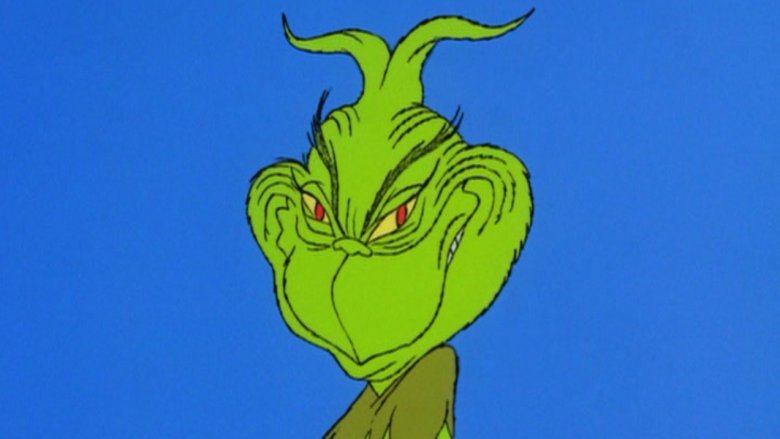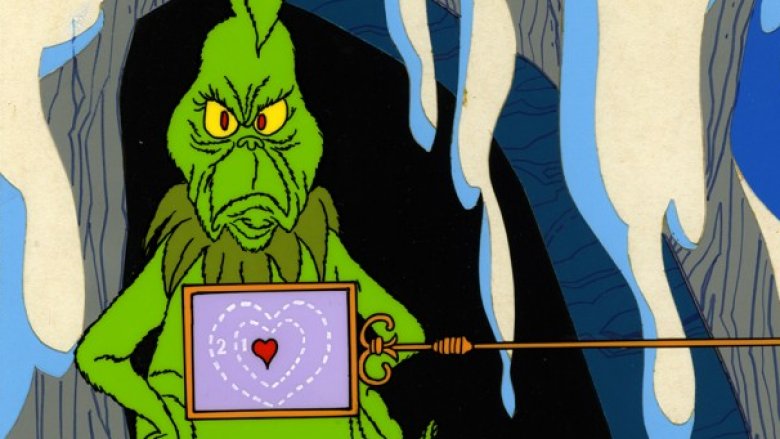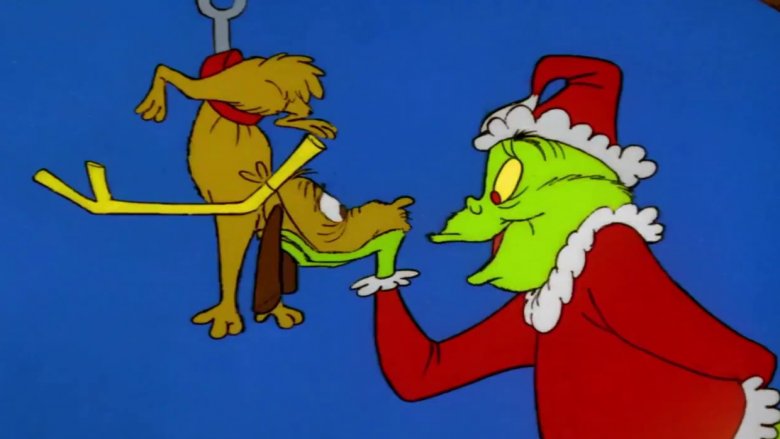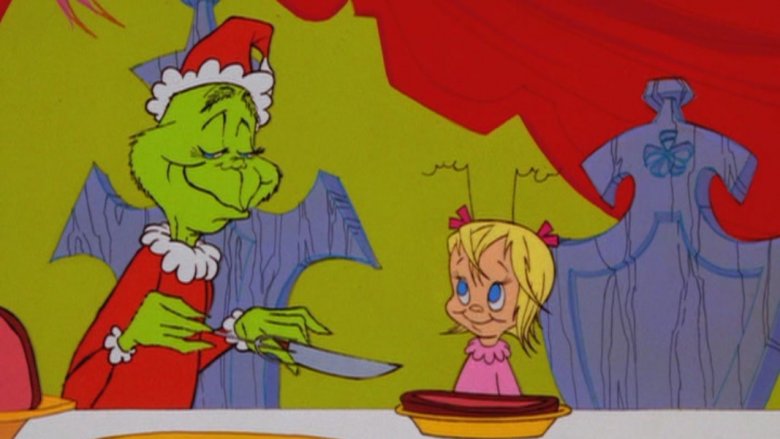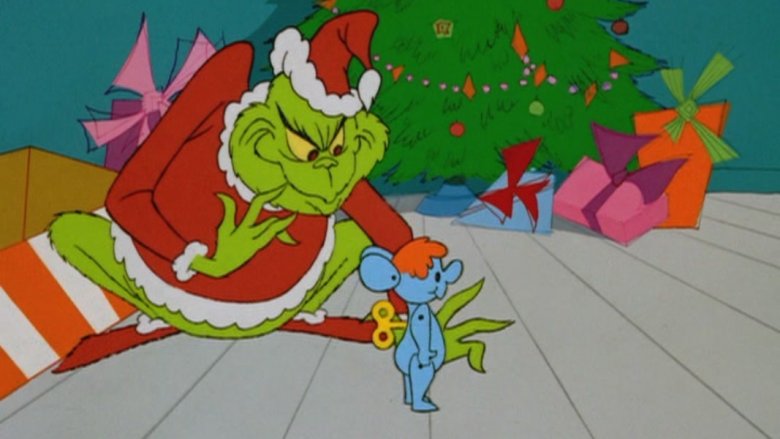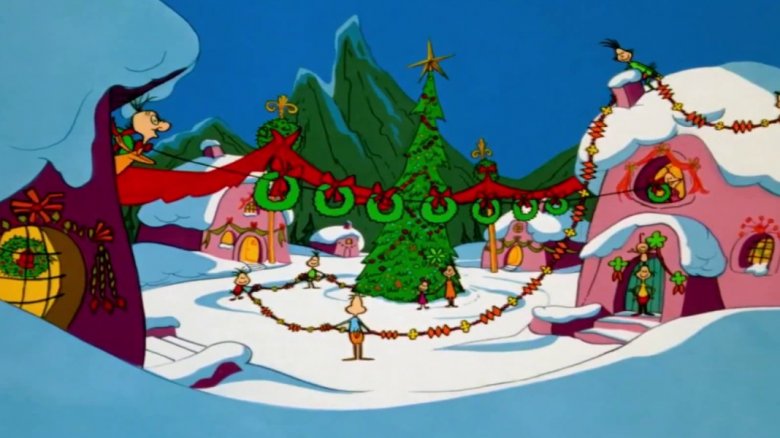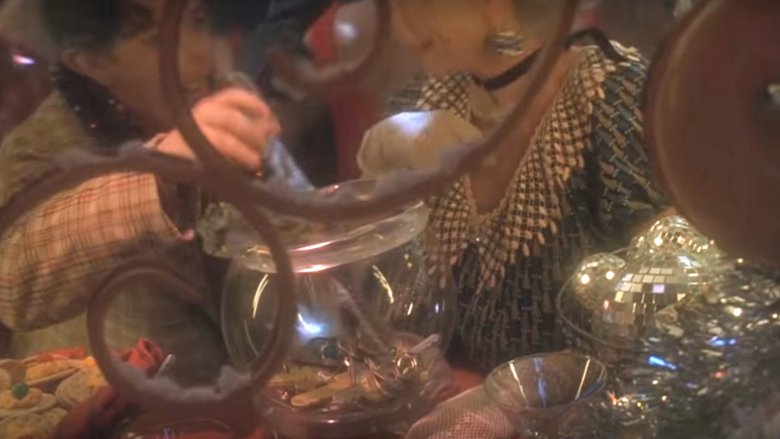Things About The Grinch Who Stole Christmas You Only Notice As An Adult
Christmas movies come and go, but there are a few holiday favorites that never lose their luster—and one of the most widely beloved is Dr. Seuss' How the Grinch Stole Christmas, the classic holiday tale that was first published in 1957 and adapted for an animated TV special in 1966. Decades later, Hollywood is once again working on another big-screen adaptation, after 2000's Jim Carrey-led version proved there's still audience interest in all things Whoville.
But like a lot of entertainment ostensibly geared toward younger viewers, there are multiple levels to How the Grinch Stole Christmas, some of which you only notice years after first experiencing Seuss' timeless tale for the first time as a kid. In fact, you look carefully at the first two versions of the story, there are a few details that come off completely differently for adult audiences than they might have in the old days — and some aspects of this tale are really just downright weird. We've gone back to Whoville with our eyes wide open and come back to give you a collection of things about The Grinch Who Stole Christmas you only notice as an adult.
The Grinch may have had legitimate health problems
In the very beginning of The Grinch, we're told that its titular "nasty wasty" really hates Christmas, for reasons unknown to the narrator and/or anyone else. But our omniscient narrator does guess that it might have something to do with the state of the Grinch's mind. "It could be his head wasn't screwed on just right," the orator guesses. "But I think the most likely reason of all/May have been that his heart was two sizes too small."
Both of those descriptions indicate more than just a moody old miser up who wants all the Whos to stay off his yard. If it's the former, he may have a mental disorder; if it's the latter, he may have a serious coronary disease. In either case, it seems rude to rhyme about the poor guy's condition like this.
His treatment of Max would not fly today
Although the book doesn't lean as heavily into the Grinch's mistreatment of his poor pooch Max, the animated movie shows him straight-up abusing the animal on multiple occasions. He whips him, neglects him, constantly berates him, and then whips him some more. All the while, he's expecting his four-legged (and only) friend to perform tasks that are well outside his physical capacity, like lugging an entire town's presents up a massive hill in the snow.
Audiences may have been able to overlook the obvious agony of the animal at the time and still root for the green meanie to become a better person (thing?) despite his mistreatment, but animal rights activists would have more to say today about any movie or character that so cavalierly abused a defenseless creature like this—especially in a children's picture.
The Whos had no idea who the Grinch even was
As much contempt as the Grinch seemed to carry for the Whos, they really didn't seem to have a clue who he was when he arrived to steal their holiday. Cindy Lou Who, of course, was far too young to be warned about any mountain-dwelling creep by her fellow townspeople, but even when the Grinch descended on Whoville to turn over what he'd stolen, they seemed to collectively shrug about his presence and were totally fine with this stranger carving up their roast beast.
Chances are, this has been a one-sided relationship all along, and the animosity the Grinch has nursed against the Whos is all in his head ... which makes a lot of sense, considering some of the other psychological and sociological implications of the story.
The theme song might just be his own mind mocking him
Considering the Whos seem to have no idea who he is, he lives alone, and the Grinch very well could have some emotional or mental disorder, the animated version's narration might be supplied by his own inner voice.
Consider some of the chief complaints the theme song raises about the Grinch: "You're as cuddly as a cactus, you're as charming as an eel"; "Your brain is full of spiders, you have garlic in your soul"; and, "You have all the tender sweetness of a seasick crocodile." As anyone who's suffered extreme social anxiety might attest, those words sound like a self-hating inner monologue. Perhaps to keep himself company, the Grinch came up with his own self-deprecating daily anthem and plays it on a mental loop. No wonder he's so grumpy.
He's basically just a bitter anti-consumerist
Dr. Seuss offered a pointed critique of materialism with How the Grinch Stole Christmas. Chief among the reasons the Grinch hates Christmas so much is that it culminates in the whole town giving each other gifts and then stuffing themselves with roast beast, and he believes that by depriving the Whos of their valuables and foods, he'll eliminate the Christmas spirit.
Christmas is, by and large, a very commercial holiday for Americans, so it's pretty obvious Seuss was taking a dig at that aspect of the "giving season"—and offering a heartwarming alternative by depicting the Whos coming together undaunted after the Grinch absconds with their stuff, deciding to celebrate the spirit of the day anyway. Under all the catchy songs and colorful animation, the message is that the holiday spirit is more powerful than our presents—and anyone who can't see that might have his head screwed on wrong, or be suffering from a heart two sizes too small.
The Grinch did forget the most important Christmas relic
During his robbery spree, the Grinch managed to steal almost everything—even down to crumbs that were still too small for a mouse — but his heist effort was ultimately unsuccessful at stopping Christmas from reaching Whoville. Not just because the Whos understood the true meaning of the season, and that wasn't a physical item he could lift, but because he forgot to take the town's bells—which created all the "Noise, noise, noise, NOISE" he hated so much.
And it's a bit surprising that he could overlook such them, since we're told in the story, "They'd do something/He liked least of all! Every Who down in Who-ville, the tall and the small/Would stand close together, with Christmas bells ringing/They'd stand hand-in-hand/And the Whos would start singing!" It's been irking him for more than half a century, and he's determined to make it stop. So how could he possibly forget to snag those bells?
Ultimately, it was the rhythm that got him
Just as inexplicable as it was for the Grinch to forget the bells that tormented him so, it's also a little ridiculous that the thing that ultimately wins him over is the Whos' group performance of Christmas music. After we're told that his disdain for holiday sing-song was part of what drove him to the point of burglarizing everyone in town ("the more the Grinch thought of this Who-Christmas-Sing/The more the Grinch thought, 'I must stop this whole thing!'"), it's their chorus that grows his heart three sizes. Perhaps it's because it managed to drown out his theme song?
The Grinch's parents were swingers
The animated Grinch had some weird things going on, but his live-action incarnation took things a few steps further. The Jim Carrey-led adaptation How the Grinch Stole Christmas (2000) added in quite a few adult jokes to spice up the kid-friendly picture, including one moment in which all the Who babies are delivered (via umbrella bassinets) to their respective parents and one husband notes that his new tot looks a lot like his wife's boss. Ba-zing!
That sequence also includes arguably the dirtiest joke of the movie—as Grinch is delivered to his new family, they're shown hosting an "annual holiday get-together" in which all the adults are getting frisky with one another and putting their keys in a fishbowl. The implication? They're swingers. And with that, it's no wonder Grinch's new parents don't even realize he's outside waiting on them until the next morning; chances are, no one's leaving that party 'til dawn.
